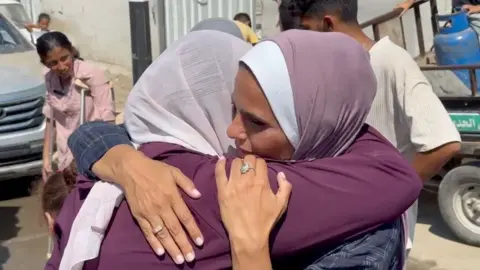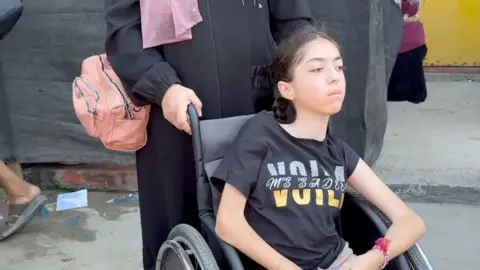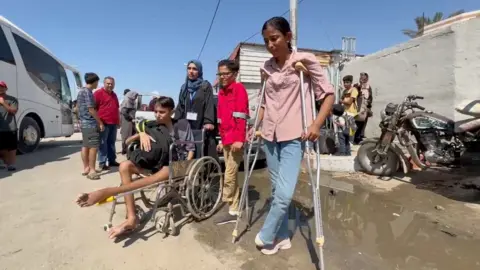Relief as Palestinian medical evacuees leave Gaza
 BBC
BBCInjured and critically ill Palestinians are on their way from Gaza to the United Arab Emirates for treatment, the World Health Organization (WHO) says, in the largest single medical evacuation since the war began following the brutal Hamas attack on southern Israel on 7 October.
Later on Tuesday the WHO said 85 sick and severely injured patients from Gaza had been evacuated to Abu Dhabi.
The sweeping Israeli military operations that followed have wrecked Gaza’s healthcare system.
And the main route for medical evacuees through Gaza's Rafah border crossing with Egypt was shut down after the Israeli military took control there in early May.
The WHO says so far some 5,000 Gazans have received treatment outside of the territory, but another 10,000 still need to leave.
This latest group began to gather on Sunday at pickup points for transport to a central location before departing.
In the central city of Deir al-Balah the bus station was crowded with patients and their families.
“I call on the whole world to look at us with compassion,” said Shaza Abu Selim, who was pushing her daughter, Lamis, in a wheelchair. The young girl needs major surgery for scoliosis, which has been delayed now by six months. She barely moved, her face stained with tears and exhaustion.
“I could not believe it when they contacted me [to say] that my daughter was among those on the list going outside Gaza for treatment,” said her mother. “I do not know when the war will end… and may God make it easy and heal everyone.”

Even before the conflict some Gazans got care outside the territory because the health system wasn’t equipped to deal with complex medical conditions.
But Israeli bombardments have closed hospitals, killed doctors, blocked medicines, and overwhelmed remaining facilities with casualties.
Nasima al-Ajeel’s story encapsulates the misery and desperation this has caused.
“We were struck” she says. “My eldest son was killed, my father was killed, my youngest son, Asser, lost his sight.”
Ms al-Ajeel is sitting and holding little Asser, his eyelid closed over an empty socket. Her leg is wrapped in bandages.
“His left eye was blown out with a skull fracture,” she said. “My middle son suffers from a leg injury and leg deformities, and I suffer a skull fracture, blindness in my left eye, and a broken shoulder and ribs."
The Israeli army says it has discovered Hamas combatants and infrastructure inside hospitals and health clinics, something the militant Islamist movement, which controlled Gaza before the war, denies.

But human rights activists have accused Israel of obstructing medical evacuations.
Physicians for Human Rights in Israel and other groups filed a petition in Israel’s High Court of Justice in early June after the Rafah crossing was closed.
Since Israeli forces captured the border area at the start of their ground operation there two months ago, Egypt has refused to reopen the crossing, the only route out of Gaza that does not lead into Israel and previously a main exit point for fleeing civilians and a major channel for aid.
Egyptian officials have insisted that the Gazan side of the crossing must be returned to Palestinian control.
As a result of the court action, the Israeli government committed to establishing a permanent mechanism for allowing regular medical evacuations.
But it has yet to do so, and on Sunday it announced it was cancelling the expected evacuation without saying why.
The Kan public broadcaster reported that Prime Minister Benjamin Netanyahu had made the decision himself, following a deadly Hezbollah attack in the Israeli occupied Golan Heights at the weekend which killed 12 children and teenagers.
That seems to have been quickly reversed. Azza Ahmed Kafarneh, a 57-year-old mother and grandmother suffering from cancer, told the BBC that the patients had prepared to go back home on hearing the news, but were told to stay because “there is a big potential that they will agree for you to leave”.
In the end the Israelis agreed to transfer the patients through Israel via Gaza's Kerem Shalom crossing and they flew out from an airport near the town of Eilat.
"We hope this paves the way for the establishment of evacuation corridors via all possible routes, including the Kerem Shalom and Rafah crossings to Egypt and Jordan, and from there to other countries,” the WHO said in a statement.
“We also call for (medical) evacuations to the West Bank, including East Jerusalem, to be restored.”
Nothing is certain in this war, and for those fortunate enough to escape it, the goodbyes are bittersweet.
Sarah Marzouk, a 12-year-old girl who says she lost her foot when her neighbour’s house was bombed, was wiping away tears at the bus station on Sunday.
“I wish that the war would end and that all children like me would be able to come with me and have artificial limbs fitted and receive treatment abroad,” she said. “I also hope that I will return to see my father in peace.”
Ms Ahmed Kafarneh said she wouldn’t leave if she didn’t feel so sick. She hasn’t heard of any medical evacuees who’ve returned to Gaza.
“I am confused between leaving my family and going out to get treated,” she said. “And things maybe will take a longer time and the war maybe will take a long time and things might get worse. Nobody knows.”
